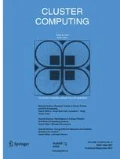Abstract
The software effort estimation is one of the active presentations in the software project administration. Accordingly, it is not frequently possible to antedate the exact guesses in the estimation of software development effort. There are many techniques used for effort estimation. But we cannot confirm that one particular method alone gives good accuracy in estimates. In this expose, a hybrid process is gracefully boosted for the estimation of the effort of software project. The innovative process is unknown; but consolidation of the fuzzy analogy by the side of the firefly and the Expectation-Maximization (EM) process that is envisaged for estimation of the software project lead to the enhancement of accuracy in prediction. Furthermore, an EM is employed to group large amount of data. The significant production is set as an input to the fuzzy analogy in parallel to the Firefly Algorithm (FA). Consecutively, the FA is competently familiar in enhancing the optimal solutions and thereby improves estimation accuracy. The fuzzy analogy reliably helps the presentation of assessing the effort of the software project. The epoch-making process is proficient in java platform and its task is competently estimated.




Similar content being viewed by others
References
Al Dallal, J.: Mathematical validation of object-oriented class cohesion metrics. Int. J. Comput. 4(2), 45–52 (2010)
Orsila, H., Geldenhuys, J., Ruokonen, A., Hammouda, I.: Update propagation practices in highly reusable open source components. In: Proceedings of 20th World Computer Congress on Open Source Software, Milano, Italy, vol. 275, pp. 159–170 (2008)
Attarzadeh, I., Ow, S.H.: A novel soft computing model to increase the accuracy of software development cost estimation. In: Proceedings of 2nd International Conference on Computer and Automation Engineering (ICCAE), vol. 3, (2010)
Attarzadeh, I., Ow, S.H.: Proposing a new software cost estimation model based on artificial neural networks. In: Proceedings of 2nd International Conference on Computer Engineering and Technology, vol. 3, pp. 487–491 (2010)
Idri, A., Khoshgoftaar, T.M., Abran, A.: Can neural netwoks be easily interpreted in software cost estimation?”, 2002 World Congress on computational intelligence, Honolulu, Huwaii, pp. 1–8, May 12–17, (2002)
Hari, C.H.V.M.K., Jagadeesh, P.R. Ganesh,G.S:Interval type-2 fuzzy logic for software cost estimation using TSFC with mean and standard deviation. In: Proceedings of International Conference on Advances in Recent Technologies in Communication and Computing, (2010)
Yadav, R.K., Niranjan, S.: Software effort estimation using fuzzy logic: a review. Int. J. Eng. Res. Technol. (IJERT) 2(5), 1377–1384 (2013)
Merugu, R.R.R., Dammu, V.R.K.: Effort estimation of software project. Int. J. Adv. Res. Comput. Eng. Technol. 1(10), 34–41 (2012)
Zia, Z., Rashid, A., uz Zaman, K.: Software cost estimation for component based fourth-generation-language software applications. IET Softw. 5(1), 103–110 (2011)
Kaushik, A., Soni, A.K., Soni, R.: An improved functional link artificial neural networks with intuitionistic fuzzy clustering for software cost estimation. Int. J. Syst. Assur. Eng. Manag 7(1), 1–12 (2014)
Batra, G., Barua, K.: A review on cost and effort estimation approach for software development. Int. J. Eng. Innov. Technol. 3(4), 290–293 (2013)
Bardsiri, V.K., Jawawi, D.N.A., Hashim, S.Z.M., Khatibi, E.: A PSO-based model to increase the accuracy of software development effort estimation. Softw. Qual. J 21(3), 501–526 (2013)
Azzeh, M., Neagu, D., Cowling, P.I.: Analogy-based software effort estimation using fuzzy numbers. J. Syst. Softw. 84, 270–284 (2011)
Alsmadi, I., Najadat, H.: Evaluating the change of software fault behavior with dataset attributes based on categorical correlation. Adv. Eng. Softw. 42, 535–546 (2011)
Ziauddin, S.K.T., Zaman, K., Zia, S.: Software cost estimation using soft computing techniques. Adv. Inf. Technol. Manag 2(1), 233–238 (2012)
Khatibi Bardsiri, V., Jawawi, D.N.A., Hashim, S.Z.M., Khatibi, E.: Increasing the accuracy of software development effort estimation using projects clustering. IEEE Trans. IET Softw. 6(6), 461–473 (2012)
Brar, Y.S., Kaur, N.: Soft computing techniques for software project effort estimation. Int. J. Adv. Comput. Math. Sci. 2(3), 160–167 (2011)
Kad, S., Chopra, V.: Software development effort estimation using soft computing. Int. J. Mach. Learn. Comput. 2(5), 548 (2012)
Singh, B.K., Misra, A.K.: An alternate soft computing approach for efforts estimation by enhancing constructive cost model in evaluation method. Int. J. Innov. Manag. Technol. 3(3), 272 (2012)
Benala, T.R., Dehuri, S., Mall, R.: Computational intelligence in software cost estimation: an emergingparadigm. ACM SIGSOFT Softw. Eng. Notes 37(3), 1–7 (2012)
Benala, T.R., Mall, R., Dehuri, S., Prasanthi, V.L.: Software effort prediction using fuzzy clustering and functional link artificial neural networks. In International Conference on Swarm, Evolutionary, and Memetic Computing (pp. 124-132). Springer, Berlin (2012)
Idri, A., Hosni, M., Abran, A.: Improved estimation of software development effort using classical and fuzzy analogy ensembles. Appl. Soft. Comput. 49, 1–55 (2016)
Idri, A., Abnane, I., Abran, A.: Missing data techniques in analogy-based software development effort estimation. J. Syst. Softw. 117, 1–23 (2016)
Malathi, S., Sridhar, S.: Optimization Of fuzzy analogy in software cost estimation using linguistic variables. International Conference on Modeling, Optimization and Computing (ICMOC-2012), (2011)
Yang, X.S.: Nature-Inspired Metaheuristic Algorithm, 2nd edn. Luniver Press, Beckington, UK (2010)
Tilahun, S.L., Ong, H.C.: Modified firefly algorithm. J. Appl. Math., Hindawi Publishing Corporation, Vol. 2012, Article ID 467631, pp. 12, https://doi.org/10.1155/2012/46763
Azzeh, M. Nassif, A. B.: Analogy-based effort estimation: a new method to discover set of analogies from dataset characteristics. IET Software, https://doi.org/10.1049/iet-sen.2013.0165
Malathi, S., Sridhar, S.: Estimation of effort in software cost analysis for heterogenous dataset using fuzzy analogy. Int. J. Comput. Sci. Inf. Secur. 10(10), (2012)
Shanker, M., Jaya, J., Thanushkodi, K.: An effective approach to software cost estimation based on soft computing techniques. Int. Arab. J. Inf. Technol. 12(6), 1–12 (2015)
Author information
Authors and Affiliations
Corresponding author
Rights and permissions
About this article
Cite this article
Resmi, V., Vijayalakshmi, S. & Chandrabose, R.S. An effective software project effort estimation system using optimal firefly algorithm. Cluster Comput 22 (Suppl 5), 11329–11338 (2019). https://doi.org/10.1007/s10586-017-1388-0
Received:
Revised:
Accepted:
Published:
Issue Date:
DOI: https://doi.org/10.1007/s10586-017-1388-0




